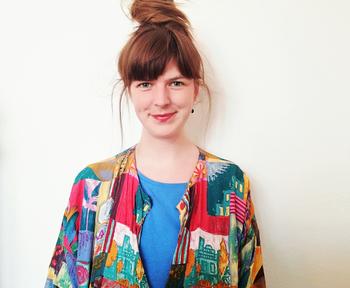Isabel Richter

International Research Training Group 'Temporalities of Future in Latin America'
Literature and Culture
PhD Project: "Exilierte Kunst. Religiösität und Avantgarde im Werk des rumänisch-brasilianischen Künstlers Emeric Marcier"
Education
|
05/2019 – 04/2022 |
PhD Candidate, International Research Training Group 'Temporalities of Future' |
| 10/2015 – 02/2018 | Master of Arts in Interdisciplinary Latin American Studies, Freie Universität Berlin |
| 10/2012 – 09/2014 | Bachelor of Arts in History & Portuguese-Brazilian Studies, Freie Universität Berlin |
| 10/2005 – 10/2012 | Magister Studies, Modern and Contemporary History, History of Eastern and Southeastern Europe & Romanian Language, Humboldt-Universität zu Berlin and Freie Universität Berlin |
Work Experience
| 05/2019 – 04/2022 |
Research Fellow, International Research Training Group 'Temporalities of Future' |
| Since 01/2019 | Administrative Assistant, 'Deutsch-Brasilianische Gesellschaft e.V.', (German Brazilian Association), PR |
| 01/2018 – 01/2019 | Voluntary Work, Association 'Pink Door e.V.', Translations |
| 04/2011 – 06/2012 |
Parliamentary Assistant, Deutscher Bundestag Administrative Assistant, Associations 'Deutsch-Rumänisches Forum e.V.' & 'Rumänien Soforthilfe e.V.' |
| 07/2006 – 08/2006 | Internship, 'Institut für Zeitgeschichte' (Institute for Contemporary History), Publishing of Foreign Policy Records of the Federal Republic of Germany |
| 02/2006 – 04/2006 | Internship, German Cultural Centre 'Friedrich Teutsch', Sibiu, Romania, Museum & PR, Research, Text Production & Translations |
PhD Project: "Exilierte Kunst. Religiösität und Avantgarde im Werk des rumänisch-brasilianischen Künstlers Emeric Marcier"
Supervisor: Prof. Dr. Susanne Klengel, Freie Universität Berlin
The PhD thesis sets out to investigate the biography and artworks of the avant-garde artist Emeric Marcier. The project aims to integrate him within the framework of exile studies and art history, and to provide space for the inclusion of other actors who escape limited categories which are based on specific national, religious or diasporic identities.
Deportado para a vida - this is the title of his autobiography, published posthumously in 2004, which describes a life marked by war, migration and new beginnings. Because of Nazi persecution, Marcier was forced to leave Paris, where he lived and worked surrounded by other surrealist artists and writer friends. His refuge took him via Portugal to Brazil, where he arrived in april 1940. The cosmopolitan artist oscillated in various ways: between Europe and Latin America, the city and the hinterland, Jewish origins and the Christian "renaissance", artistic centres and an almost hermit-like life. In Brazil, the former surrealist artist began to produce an increasing number of religious artworks, which testify to global and personal caesurae. Forced migration and suffering caused by war are represented by biblical motifs, beside depictions of an apocalyptic future pointing to redemption. Despite Marcier‘s once important role in the Brazilian artworld, his trajectory is little known today.
How did he deal artistically with biographical ruptures and global turning points and which representations of the future did he offer in his works? How is his aesthetic statement received in different places and times? Which factors contribute to the oblivion and decay of mural works? The artist's complex case represents a challenge for exile studies and art history. It shows, how biographical decisions and socio-political circumstances, as well as blind spots in the context of both art history and exile studies, lead to the oblivion and decay of relevant works. In the context of memory culture research as a part of exile studies, the problem of Jews who converted to Christianity becomes visible: this grey area raises the question of how to deal with the artistic artefacts of actors who fall between the cracks. These points of interest in the context of the biographical study lead to the overarching research question: which concepts can be proposed to include those memories and to open up possibilities of preserving the works of actors who are difficult to classify into a category?
Chapters
Richter, Isabel (2024): “Representações estéticas sobre a experiência da guerra e do exílio nas obras religiosas de Emeric Marcier”, in: Altevoigt, Alexander (Hg.): Ruturas históricas e reações literárias, Berlin: LIT-Verlag.
Richter, Isabel (2023): "Emeric Marcier: Die Konversionen eines rumänisch-brasilianischen Künstlers”, in: Romanița Constantinescu / Iulia Dondorici (Hg. / éds.): Ost und West in der Romania. Globale und regionale Vernetzungen der rumänischen Literaturen / Entre Est et Ouest. Interconnexions globales et régionales des littératures roumaines, Berlin: Frank & Timme, S. 121-160.


